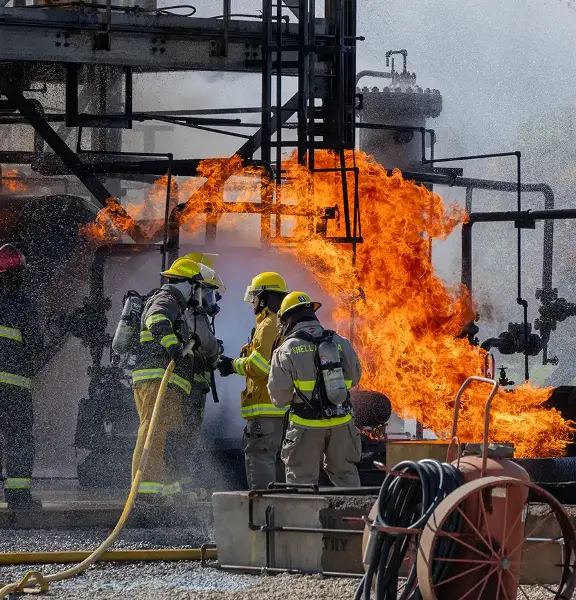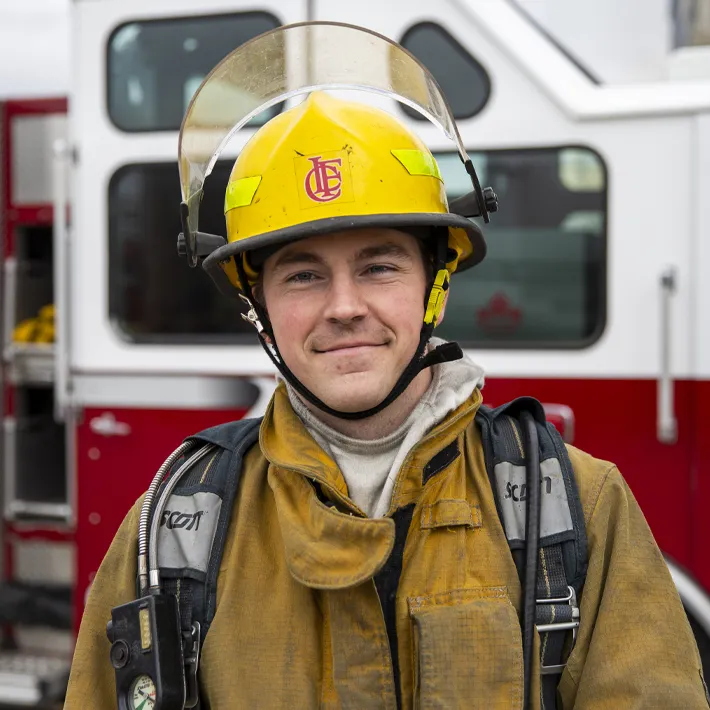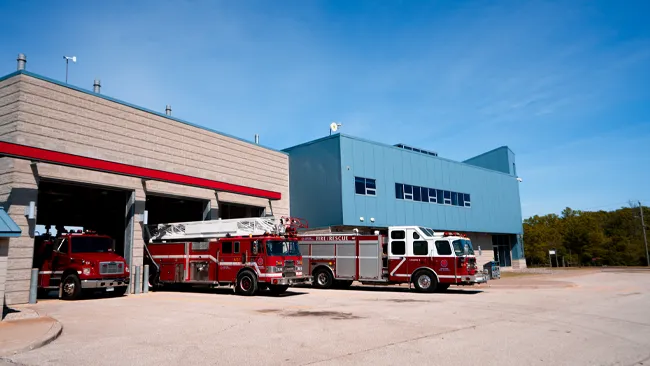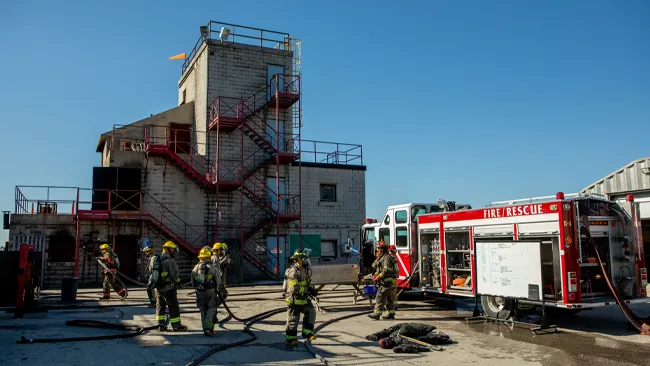

Fire Science Technology
Overview
Go beyond what you've learned in Pre-Service Firefighting Education & Training and position yourself for a successful future in the firefighting industry.
This 10-month Ontario College Advanced Diploma program is designed with theory and hands-on applications to provide students with the necessary job skills to perform advanced level duties in a variety of fire suppression and specialty technical rescue fields.
The program is designed to accept graduates of any Pre-Service Firefighter Education & Training program in Ontario as well as current fire service personnel (through a Prior Learning Assessment) as direct entrants into the Fire Science Technology program.
Graduates of this program gain specialized career expertise, technical knowledge and skills, with over 300 hours of practical experience that will enable them to start or further their careers in the fire suppression and emergency rescue field. Internationally recognized and respected National Fire Protection Association (NFPA) skills obtained in this program will enhance graduate employability and the individual's long-term opportunities for advancement. No other college in Ontario offers this unique opportunity to further develop the Pre-Service Firefighter Education & Training skills to position the graduate as a serious municipal firefighter candidate.
Take a look at our Fire Grounds
Located 14 km from the main campus and the largest live fueled training centre in Canada. Contact us to set up a tour of our one-of-a-kind facility.
Admission Requirements
- Pre-Service Firefighter Education & Training Certificate
-or-
Prior Learning Assessment with:
- NFPA 1001 Level I and Level II ProBoard or equivalent
- NFPA 1072 Awareness ProBoard or equivalent
- NFPA 1072 Operations ProBoard or equivalent
- Current York Physical Fitness or CPAT test or equivalent
-and-
O.S.S.D. or equivalent with:
- Grade 12 English C or U
- Grade 11 or 12 Mathematics C or U
- Grade 11 or 12 Chemistry C or U
Highly Competitive Program
This is a highly competitive program and students are encouraged to apply by February 1 - the equal consideration deadline.
Offers to this program will be issued after February 1st, 2026.
Meet Shaun & Ian
See where Lambton College took these two firefighting students who are now full-time municipal firefighters.
Costs
- Year 1 $10,295.50
Please Note: These fees apply to the 2025-2026 academic year and are subject to change. Fees do not include books (unless specifically noted), supplies or living costs.
Additional Fees
-
Self-Contained Breathing Apparatus (SCBA) Rental$1,670.00
-
PPE (helmet, gloves, fire boots, balaclava, vehicle extrication gloves, safety shoes, and glasses)$1,350.00
-
Bunker Gear Rental$785.00
-
Uniform (pants, belt, shirt)$165.00
-
Red Cross Material and Administration Fee$35.00
-
Accountability Badge$15.00
Pre-Service Firefighter Education & Training Students
If you already have some of the equipment listed from taking the Pre-Service Firefighter Education & Training program, you are not required to purchase again.
Recommended Fees
All of the items listed are required provided you haven't already purchased for a Pre-Service Firefighting Education & Training program with the exception of the Rope Gloves. In addition to the items listed, the following fees are also recommended:
- OFMEM Testing - fees determined by the OFMEM
- Ontario DZ License (written & driven tests) - fees determined by the MTO
- Travel - Students are responsible for travelling between main campus and the Fire School (14 km) Carpooling is encouraged.
Technology Requirements
In order to keep pace with the requirements of each and every course in your program, Lambton College requires that each student have access to a laptop while studying at our college.
Labs & Equipment
Courses
Structural Firefighting Operations
This course is designed to introduce the student to structural suppression techniques as applied to a recruit-level competency. The student will demonstrate proficiency of the subject matter learned previously through a Pre-Service Firefighter Training Program and/or NFPA 1001 certification or equivalency and will continue to build on these experiences with live fireground exercises involving fire suppression within an Incident Command/Management System (ICS/IMS). This course will also focus on Incident Safety Officer Awareness and Advanced Firefighting Techniques such as hose handling, forcible entry, high rise operations, and Vent-Enter-Isolate-Search (VEIS). Students will continue refining Emergency Medical Responder training skills through practical training scenarios.
Aerial & High Rise Operations
This course is designed to utilize and build on foundational skills learned in the preservice firefighting program. Students will study high-rise building construction techniques and how different construction features may contribute to smoke and fire spread to areas remote from the area of fire origin. Students will learn how high-rise building fire suppression systems function, how to utilize these systems to assist with evacuation, rescue and extinguishment and actions that must be taken when suppression systems fail. In addition, students will learn how to maximize use of aerial apparatus to assist fire departments with access, evacuation, rescue, and water supply in the event of building fire suppression system failure. Students will develop leadership skills and be progressively challenged, physically and mentally, to make rapid decisions and execute time sensitive tasks as part of a team.
Fire Dynamics & Behaviour
This course provides the basic concepts of chemistry of combustion as a foundation in the field of fire science and the correlation between fire chemistry, building types and construction, external and internal forces and flow path management through active and passive instruction methods.
Fire & Life Safety Educator
This course is designed to provide students with the skills necessary to successfully achieve NFPA 1035. Certification in the following disciplines - Fire and Life Safety Educator Level I as well as Public Information Officer. Upon completion, students should be able to deliver and coordinate existing fire and life safety education at various levels within a community. In addition to looking at fire behaviour, human behaviour during fire, educational methodology, basic fire protection systems and devices, this course will also emphasize the planning and applied learning theories pertaining to fire and life safety education. As part of the Public Information Officer content, the course will emphasize effective writing skills as well as media dissemination and monitoring skills, through enhancement of interview skills and the development, maintenance, and strengthening of relationships with community group.
Fire Science Fitness III
The focus of this course is to help prepare students for the severe physical demands of Firefighting.
Fire Science Math
This course provides a review of fundamental math concepts. These essential math skills are required for success in college programs requiring a solid foundation in mathematics. It is designed to meet the needs of individuals that have completed Grade 12 math but need a quick review in preparation for college-level or skills training programs. Successful completion of the course is generally accepted as equivalent to a Grade 12 standing in mathematics. It does not, however, qualify the student for an Ontario Grade 12 math credit.
Critical Thinking & Writing
This writing course challenges students to explore diverse opinions and articulate their own perspectives clearly and persuasively. Through critical reading, students will develop skills in synthesis, analysis, comparison, and response, striving for clarity and diplomatic expression of their opinions based on factual evidence. Students will practice various rhetorical strategies of persuasion and hone their writing to ensure precision and accuracy in their messages. This course lays the foundation for a subsequent research-writing course, equipping students with essential skills for academic success.
General Education Elective
Special Emergency Operations
This advanced module is designed to teach students further skills required to successfully undertake basic and advanced fireground tasks in municipal and industrial fire service environments as outlined in NFPA 1081, chapters 5, 6, and 7. Additional subjects covered include Fireground Fundamentals and Fireground Survival as outlined by the International Association of Firefighters (IAFF); and Technical Rescuer Professional Qualifications as outlined in NFPA 1006 (2021 Edition) Chapter 8 Awareness, Operations, and Technician level (Auto Extrication).
Fire & Rescue Operations
This advanced level module is designed to teach students further skills required to conduct basic and advanced fireground tasks in municipal department environments. Subjects covered in this course include building construction, advanced level fireground operations including structural firefighting, search and rescue procedures, Technical Rescuer Professional Qualifications as outlined in NFPA 1006 (2021 Edition) Chapter 7 Awareness, Operations, and Technician level (Confined Space Rescue) and Technical Rescuer Professional Qualifications as outlined in NFPA 1006 (2021 Edition) Chapter 5 Awareness and Operations level (Rope Rescue).
Fire Appartus Operations
This course is designed to introduce the student to the operation and mechanical workings of Fire Pumper Apparatus, Aerial Apparatus and Tender Apparatus consistent with NFPA 1002 (2017) Chapters 4, 5, 6 and 7. Students will demonstrate skills for weekly checks specific to the type of apparatus being operated. Students will be driving Fire Apparatus to develop skills for proper emergency apparatus operations as outlined in NFPA 1002 (2017) Chapter 4. Subjects covered in this course shall include theory and practical evaluations. Upon completion of this course, students will have developed an understanding and will be able to demonstrate skills to test for the "Z" brake endorsement and a Class "D" Ontario license. The skills testing exercises and DZ licensing are offered through a third party service provider and may be subject to additional costs.
Fire Science Job Strategies
Fire Science Technology graduates are part of a highly competitive field of qualified candidates working to find employment in the fire service or fire-related fields. This course builds upon the learner's acquired knowledge and skills developed in the prerequisite course JSS-1001. Today's Fire Science graduate is expected to be able to successfully secure employment by presenting and promoting themselves professionally to prospective employers, through precise and effective written and verbal communication skills.
Emergency Preparedness
This course focuses on the coordinated efforts that are required to respond quickly and effectively to a broad range of emergencies from pandemics, to natural wide ranging weather events, man-made and deliberately planned disasters or terrorist attacks. Students focus on case-studies and problem-based learning. Students will gain a practical perspective of the various emergency response agencies and their roles as well as detail the importance of interaction, interagency collaboration and effective communication of responders at the scene.
Fire Science Fitness IV
The course involves specialized assessment of health/performance fitness for potential firefighter recruits. The areas of emphasis will be: all components of fitness training, and lifestyle management for firefighters. In addition, students will practice job simulation/performance tests which simulate commonly encountered firefighting operations.
Applied Physics
This course aims to give the learner essential physics principles, emphasizing fire science applications. The topics covered are those of classic physics including motion, mechanics, fluids, heat and electricity. A two hour laboratory, held every other week, runs concurrently with three hours per week of lecture.
Communications for Fire Science
This course is designed to further develop students' communication proficiency, oral and written, which is required to be successful in the field of fire services, including the areas of prevention and education. Students will create workplace specific documents and research reports and will share their findings through oral presentations. Current fire services related issues will serve as the impetus for creating informed research reports and presentations.
General Education Elective
Provincial Testing & Skills Evaluation
This course is designed to advance the student's level of knowledge pertaining to emergency medical care. Through a demonstration of both theoretical knowledge and practical, scenario-based skills, students will be eligible to obtain certification as an Emergency Medical Responder based on current Canadian Red Cross program standards.
Fire Apparatus Operations - DZ Evaluation
This course provides the student the opportunity to review the knowledge and practical skills required for and to participate in voluntary Driver testing for DZ licensing as determined by the Ministry of Transportation of Ontario.
Aerial & High Rise Operations Evaluation
FSC 6033 will build on knowledge and skills obtained in FSC 4026 Aerial and High Rise Operations. This course will challenge students, acting in various leadership roles, to set strategic goals and select appropriate tactics to meet objectives. Students will continue to refine size-up and communications skills, under simulated high stress, time compressed environments where incident information is often incomplete. Students will refine their knowledge and skills of tactical ventilation. Finally, the course ties together and expands on the concept of fire attack coordinated with ventilation.
Co-op Work Term (Optional)
Co-operative education provides students with the opportunity to apply classroom learning to the workplace, undertake career sampling and gain valuable work experience that may assist students in leveraging employment after graduation.
Contact
School of Fire Science, Health & Community Services
Program Information
After Graduation
Employment Opportunities

Typical positions that our graduates find include: municipal fire departments in the fields of fire suppression and prevention; industrial manufacturing in the areas of fire suppression and prevention, emergency equipment sales, rescue response, fire protection system maintenance and insurance company loss prevention specialists.
In order to be eligible for consideration for employment in a municipal fire department within the Ontario fire service you are required to:
- Work on rotating shifts, including nights, weekends, and holidays
- Speak, read, and write in fluent English and communicate clearly and precisely in high pressure situations
- Have a Standard First Aid certificate and a valid CPR at the Basic Life Support level
- Be 18 years of age or older at the time of application and possess an O.S.S.D. or equivalent
- Be legally entitled to work in Canada (citizen, landed immigrant) and free of any criminal convictions for which a pardon has not been granted
- Some fire departments require candidates to meet the NFPA 1582 Vision Standards
Co-op
About Co-op
Students in this program have the opportunity to gain valuable work experience by applying classroom learning during co-op experiences.
Learn more about co-op terms and the roles and responsibilities of students and co-op advisors.
More Information
Skill Demands
All students are required to meet the following demands:
- Applicants must be able to lift a bulk mass of 18 kg (40 lbs) and have the ability to dismantle and assemble large pieces of equipment.
- A satisfactory level of both fine and gross motor control.
- Must climb vertical ladders and walk on platforms with open gratings.
- Will not be allowed to wear glasses when wearing breathing apparatus.
- Must be clean shaven to ensure a good seal with the face mask.
- Must possess at minimum a G2 license by the end of the fall semester.
The following are not requirements of the program, but students should be aware that these requirements must be met if you are hoping to pursue a career with the municipal fire service:
- Visual requirements of 20/30 in each eye, without the use of contact lenses, and satisfactory completion of a colour vision assessment may be required.
- Should not be convicted of a criminal offense for which a pardon has not been granted.
- Should be able to communicate in English, both written and orally.
Some students with disabilities may require academic accommodation to equalize opportunities to meet the academic demands of a course or program.
Technology Requirements
It is recommended that you use a Windows laptop for your coursework. While other devices like MacBooks or Chromebooks might work for some tasks, they may not support all the software required for your program. If you're unsure, check with your professors before buying.
Internet Speed Requirements
To get the best experience while learning online, we recommend having an internet connection with at least 40 Mbps download speed and 10 Mbps upload speed. This will help you use video calls, attend online lectures, and access other learning tools smoothly.
Because students live in many different areas, we can't suggest a specific internet provider. You'll need to check with local companies to find one that works best for you.
Laptop Requirements
In order to access the internet and virtually-delivered software and courseware, student laptops should include the following at a minimum. By meeting the following specifications, students will be equipped to access software and courseware on their laptop through the internet:
- Intel i5 8th Gen Processor or equivalent
- 8GB of RAM
- 100 GB HDD or more
- Webcam with a microphone
- Wi-Fi capable (802.11n/ac 5GHz)
- Windows 11 operating system
Mobile Device
Students will require a mobile device (smartphone) for:
- Accessing your digital student ID
- Using campus applications and services
Software
To ensure students are getting the most our of their classroom experience, some software will be required.
Lambton College has made this software easily accessible online. Students can leverage our Microsoft Office 365 software packages and services. In addition, much of the software you require for your courses will be available on demand for use on any device - on or off campus.

